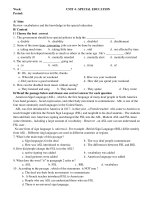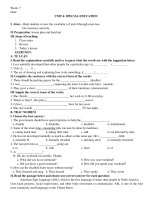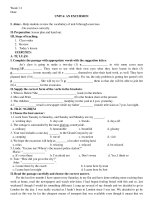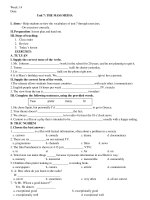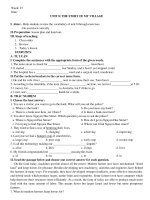- Trang chủ >>
- Đề thi >>
- Đề thi lớp 7
Bai Day Bam Sat Unit 10 12CB
Bạn đang xem bản rút gọn của tài liệu. Xem và tải ngay bản đầy đủ của tài liệu tại đây (3.09 MB, 5 trang )
<span class='text_page_counter'>(1)</span>BÀI BÁM SÁT 12 (Theo Chuẩn Kiến Thức-Kỹ Năng) UNIT 10 1a. Choose the word with the different pronunciation of the underlined part. 1. A. danger 2. A. global 3. A. easy 4. A. official 5. A. animals. B. blank B. loss B. clean B. percent B. leaves. C. habitat C. toxic C. earth C. special C. lives. D. impact D. top D. mean D. species D. lists. 1b. Choose the word with the different stress pattern. 6. A. future 7. A. commercial 8. A. development 9. A. elephant 10. A. ability. B. wildlife B. industry B. individual B. gorilla B. conservation. C. reserve C. sufficient C. priority C. ivory C. governmental. D. mountain D. destruction D. environment D. tropical D. exploitation. 2. Match a word in A with its correct definition in B. A 1. species 2. toxic 3. fertile 4. identify 5. vulnerable 6. drainage 7. reserve 8. challenge 9. extinct 10. survive. B a. containing poison; poisonous b. a new or difficult task that tests somebody's ability and skill c. recognize sb./sth. and be able to say who or what they are d. continue to live or exist despite a dangerous event or time e. the process by which water or liquid waste is drained from an area f. producing a large number of good quality crops g. a set of animals or plants in which the members have similar characteristics and can breed with each other h. a piece of land that is a protected area for animals, plants... i. weak and easily hurt physically or emotionally j. no longer in existence. 3. Choose the best answer. 1. It is a duty of every human...........to save the marvellous array of life on our planet. A. life B. beings C. people D. being 2. You will be happy to know that..................efforts have already brought many animals back from the brink of extinction, but still, our work is far from done. A. conservation B. preservation C. protection D. defence 3. The statistics regarding..........animals are shocking. A. dangerous B. danger C. endangered D. endangering 4. Many rare species ........... to a pharmaceutical industry worth over $40 billion annually. A. give B. suggest C. devote D. contribute 5. ..........many plants and animals, we don't get sick very often. A. Thanks B. Thanks to C. Thank for D. Thankful 6. When animals do...........themselves, and hurt us in the process, we think they are cruel, and evil. A. defending B. to defens C. defend D. defended 7. We need to stop worrying about..........so much, and start helping out other plants and animals that can barely survive. A. ourselves B. us C. them D. themselves 8. If you take a look at the ten most endangered animals of the world, you will find that most of them.........in Africa. A. found B. were lived C. existing D. were found 9. It has been observed that extinction is..........directly or indirectly by humans. A. having B. caused C. makes D. led 10. The black lemur, chimpanzee are..........of endangered animals in Africa. A. that B. considered C. included D. examples 1.
<span class='text_page_counter'>(2)</span> 4. Fill each gap in the sentences with the correct form of the word in brackets. 1. Britain's ........... of its natural gas reserves began after the Second World War. (exploit) 2. Tom's father works as a...........who studies micro organisms, (biology) 3. The invention of telephone was not..................successful at first, (commerce) 4. The negative impact of...........was felt in many aspects of life, (urban) 5. There seems to be a general ........... that this is not the solution, (aware) 6. We admire the job of these local........, who take an active part in the protection of the environment. (conservation) 7. Land erosion is caused by widespread................... (forest) 8. One 1999 report argued that the Russian musk deer population had dropped by as much as 50 percent in the previous decade due to................... (hunt) 9. Many .................. agencies express their worry about the trading of endangered animals. (govern) 10. We saw from the ..................of her expression that the animals were mistreated. (serious) 5. Fill each gap in the passage with a suitable word or phrase from the box. compounds, cycle, ecosystem, extinct, humans, medications, overpopulation, point, species, weapons Endangered species need help so that they don't become extinct. If they do, it can lead to overpopulation of other animals. For example, if Grey Wolves go extinct, there might be an (1).................. of their prey, elk and deer. If elk and deer are overpopulated, they will eat too many mushrooms and plants which would then go (2).................., causing other animals that eat those foods change their diet. It is a never-ending (3).................., but if we can stop some animals from going extinct, we will have a much more balanced ecosystem. “The (4).................. is a tapestry of species and relationships. Pull one thread am fabric changes." Second, endangered species need help because they are responsible for a variety of useful (5)................... In fact, almost forty percent of all prescriptions written are made from the natural (6).................. of different species. Without these important plants and animals, many people would be dead, dying, or sick. Last, endangered species deserve more help because they can't defend themselves. It is cruel to hunt animals to a (7).................. of near extinct. People should be able to hunt, but only to a certain point. Animals don't have the kinds of (8).................. we have; they only have natural things like running, hiding, and biting. We should be using our expertise to help other things, not destroy them. Endangered (9)..................need more help than they are currently receiving. Animals and plants provide medical help, companionship, and knowledge to society. If they go extinct, so will many other animals. Perhaps if (10)............ weren't so greedy, the world would be a much better place to live in, for all of us. 6. Fill each gap in the passage with a suitable word. ENDANGERED ANIMALS IN THE RAINFOREST Do you know that destructive human activities are responsible for the curr rate of species extinction, (1).................. is at least 100-1,000 times higher than the expected natural rate? Rainforests (2).................. the biggest suppliers of oxygen on the Earth, but it is estimated that 23 plants species are extinct in (3)..................wild, 151 species are endangered, 274 species are vulnerable and 688 species are rare. According (4).................. the experts estimations and available statistics, we are losing 137 plant, animal and insect species every single day, due to rainforest (5).................., which equates to 50,000 species every year. Disappearance of plants leads to disappearance of (6)................... If you explore rainforest animal adaptations, you will be surprised to find how animals try their (7)..................to survive, by adapting with the nature. According to the nature's law regarding 'survival of the fittest', those animals which can (8)..................adapt with nature cannot survive. But animal hunting and deforestation has led to a very serious situation, where the rate of extinction animal species (9)..................has sped unnaturally over the last 400 years, rising sharply since 1900. Tigers, cheetah, jaguars, leopards, mountain gorillas are sor of the (10)..................animals in the rainforest. 7. Complete the following sentences with one of the following words. Some sentences offer two possibilities. can, could, may, might, should ought to, shall, will 1. The article stated that he..................read at the age of three. 2. You..................take a sweater in case it gets cold. 3. It's going to rain all afternoon...................we go to the cinema? 4. Scott..................be 21 at the end of the month. 2.
<span class='text_page_counter'>(3)</span> 5. Julie said the traffic was heavy, so she..................be late for the meeting. 6. You look a bit confused...................I help you? 7. You stole a CD from a friend? You..................be ashamed of yourself! 8. I don't know the meaning of this word...................I borrow your dictionary? 9. Stop smoking! You really..................not smoke. 10. Muneera..................come to the party, but nobody is sure. 8. Complete the following sentences, using a modal verb in each gap. The verb can be positive or negative. 1. When you have a small child in the house, you .................. leave small objects lying around. Such objects .................. be swallowed, causing serious injury or even death. 2. Ned:..................1 borrow your lighter for a minute? Stephen: Sure, no problem. Actually, you..................keep it if you want to. I've given up smoking. 3. Leo: Where is the spatula? It .................. be in this drawer but it's not here. Nancy: 1 just did a load of dishes last night and they're still in the dish washer. It ..................be in there. That's the only other place it..................be. 4. I..................speak Arabic fluently when 1 was a child and we lived in Egypt. But after we moved back to Canada, 1 had very little exposure to the language and forgot almost everything 1 knew as a child. Now, I ..................just say a few things in the language. 5. Ted's flight from Amsterdam took more than 11 hours. He .................. be exhausted after such a long flight. He..................prefer to stay in tonight and get some rest. 9. Read the passage and choose the best answer. 1. You seem to be having trouble there....................I help you? A. Would B. Will C. Shall D. Won't 2. I don't have enough money to buy lunch......................you lend me a couple of dollars? A. May B. Could C. Shall D. Might 3. That ice is dangerously thin now. You...................go ice-skating today. A. mustn't B. might not C. would mind not D. won't 4. It's way past my bedtime and I'm really tired. I ...................go to bed. A. can B. ought C. could D. should 5. He...............have committed this crime. He wasn't even in the city that night. A. might B. shouldn't C. couldn't D. mustn't 6. John is over two hours late already. He...................missed the bus again. A. should have B. must have C. will have D. can't 7. I'm really quite lost....................showing me how to get out of here? A. Would you mind B. Would you be C. Must you be D. Can you be 8. That bus is usually on time. It...................to be here any time now. A. might have B. has C. can have D. ought 9. I read about your plane's near disaster. You ...................terrified! A. might have been B. must have been C. shall have been D. should have been 10. It's the law. They...................have a blood test before they get married. A. might B. could C. have to D. may 10. Complete the second sentences, using the modal verbs given. Example: Perhaps she fell. (May). She.................................... She may have fallen.. 1. Perhaps they said that. I can't remember now. They....................................................................................................... 2. Perhaps she saw the robber. She......................................................................................................... 3. I think we took the wrong road, we're lost. 1 think we ............................................................................................. 4. I wish you had seen it. It was spectacular! You should............................................................................................ 5. Perhaps when I'm 60 I won't remember her. When I’m 60......................................................................................... 6. You should have listened to her from the beginning. You......................................................................................................... 7. It was possible for me to go but 1 didn't. I.............................................................................................................. 3. (have) (might) (must) (have) (will) (ought) (could).
<span class='text_page_counter'>(4)</span> 8. I ought to have known that you would be late. (should) I.............................................................................................................. 9. It is possible to have happened but not likely. (could) It ............................................................................................................. 10. They wondered out loud as to what to do next. (shall) “What....................................................................................................?” 11. Read the passage and choose the best answers. Most animals use more than one species as food. Therefore, the term food web is a better description of food relationship than the term food chain. A food web is a complex feeding systems that contains several food chains. For example, mice, rabbits and deer eat plants. Owls eat meat and rabbits. Mountain lion eats rabbits and deer. These five species are parts of food chains that together form a food web. The first link in a food chain is always a green plant. Only organisms with chlorophyll, such as green plants, can make food. For example, the first link in the aquatic chains is algae. Most algae are microscopic green plants that produce food by photosynthesis. In photosynthesis, energy from sunlight converts carbon dioxide and water to sugar. Tiny fish in lakes, streams and oceans eat algae. In turn, these tiny fishes are eaten by larger fish. These larger fish are eaten by still larger fish. The food supply for fish is made by algae.This food is then passed through the food chains as one animal eats another. Organisms may be divided into three groups based on how they obtain food. These groups are producer, decomposer and consumer. Organisms containing chlorophyll are producers. Thus, green plants are producers. Animals that eat other animals and plants are consumers. Microbes, one-celled organisms that cause the decay of the dead animals and plants are decomposers. Since, decomposers cannot make their own food, they are also consumers. 1. The main purpose of this passage is to................... A. determine which food chain is the most efficient B. describe the food network among plants and animals C. explain the process of photosynthesis in green plants D. appeal to conservationists to protect endangered 2. According to the author, what is the food web? A. A complicated system of several food chains. B. A society that distributes food. C. The relationship of one green plant to another. D. The spiders use to catch food. 3. Which of the following would most likely be the first link in a food chain? A. Termites. B. Fish. C. Lions. D. Grass. 4. As used in last sentence of the second paragraph, the word passed' could best be replaced by which of the following? A. Moved. B. Approved. C. Attempted. D. Relinquished. 5. The author divides the organisms according to................ . A. how they use energy B. how they obtain food C. how much energy they require in order to move D. whether they live on the land or in the sea 6. Which of the following organisms could NOT be a consumer as described in the passage? A. A microbe. B. A rabbit. C. A tree. D. A fish. 12. Use words and phrases below to build up a meaningful story. 1. Most of / people / visit New Zealand / fascinated by / common thing / and that / kiwi bird. 2. Kiwi birds / so uniquely / different / all / other birds / earth / and found only / islands / New Zealand. 3. One reason / couldn't migrate / other habitats / can / associated with / fact that / they / wingless / flightless. 4. According / some research studies / Kiwis never / evolved much / and so / characteristics / not match / with / other birds. 7. The size / kiwi / is generally / that / chicken. It / long beak / thick brown hair / entire body / instead / wings / feathers. 8. This bird / almost blind / see better / in / night / compared / day. 9. Another interesting thing / it has nostrils / end / beak / and / good smell sense / that it uses / hunting. 10. Kiwi birds / shy / mostly found hidden / bushes, farm lands, grass lands, river lands, / anywhere they / cover themselves / save themselves / predators. The End Ngân Phương Vy 4.
<span class='text_page_counter'>(5)</span> ANSWER KEY 1. 1A. 2A. 3C. 4B. 5D. 6C. 7B. 8B. 9B. 10A. lg. 2a. 3f. 4c. 5i. 6e. 7h. 8b. 9j. 10d. 1D. 2A. 3C. 4D. 5B. 6C. 7A. 8D. 9B. 10D. 2. 3. 4. 1. exploitation 4. urbanization 7. deforestation. 2. biologist 5. awareness 8. overhunting. 3. commercially 6. conservationists 9. governmental. 10. seriousness. 1. overpopulation 5. medications 9. species. 2. extinct 6. compounds 10. humans. 3. cycle 7. point. 4. ecosystem 8. weapons. 1. which 6. animals. 2. are 7. best. 3. the 8. not. 1. could 2. should/ ought to 3. shall 4. will 5. might. 6. Can 7. ought to/ should 8. may 9. should 10. could/ might. 5.. 6. 4. to 8. has. 5. deforestation 10. endangered. 7.. 8. 1. shouldn't - could 2. Can -can 3. should - must - could. 4. could - can 5. must - might. 9. 1C. 2B. 3A. 4D. 5C. 6B. 7A. 8D. 9B. 10C. 10. 1. They might have said that. I can't remember now. 2. She might have seen the robber. 3. I think we must have taken the wrong way, we're lost. 4. You should have seen it. It was spectacular! 5. When I'm 60 I will have forgotten her. 6. You ought to have listened to her from the beginning. 7. I could have gone but I didn't. 8. I should have known that you would be late. 9. It could have happened but not likely. 10. "What shall we do now?" they asked. 11. 1B. 2A. 3D. 4B. 5B. 6A. 12. 1. Most of the people who visit New Zealand get fascinated by one common thing and that is kiwi bird. 2. Kiwi birds are so uniquely different from all the other birds on earth and found only on islands of New Zealand. 3. One reason they couldn't migrate to other habitats can be associated with the fact that they are wingless or flightless. 4. According to some research studies Kiwis never evolved much and so their characteristics do not match with the other birds. 7. The size of a kiwi is generally that of a chicken. It has a long beak and thick brown hair on the entire body instead of wings and feathers. 8. This bird is almost blind and can see better in the night compared to the day. 9. Another interesting thing is that it has nostrils at the end of the beak and has good smell sense that it uses for hunting. 10. Kiwi birds are shy and mostly found hidden in bushes, farm lands, grass lands, river lands, or anywhere they can cover themselves and save themselves from pedators. 5.
<span class='text_page_counter'>(6)</span>





